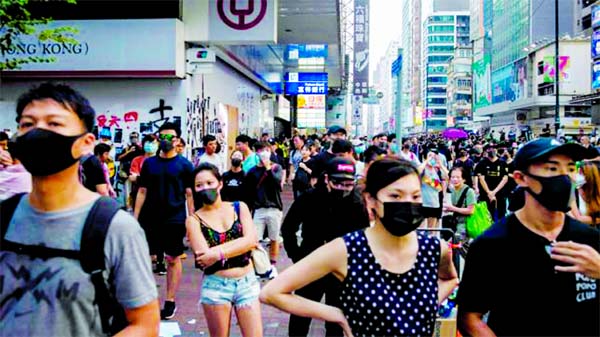
AFP, Hong Kong :
Paralysed by seething protesters and intransigent bosses in Beijing, Hong Kong’s government lacks the power and experiences to end the unprecedented political crisis in the city, analysts say.
The semi-autonomous international hub has been rived by increasingly violent protests for more than four months, with demonstrators demanding greater democracy and police accountability as violence spirals on all sides.
Yet so far, all the major steps taken by Beijing-backed city leader Carrie Lam have failed to deal a decisive blow against the movement or dissuade protesters from hitting the streets.
Some moves have fanned the flames further.
A ban on face masks during protests, using colonial-era emergency powers, sparked a wave of violence and vandalism that brought much of the city to a standstill earlier this month.
“Hong Kong’s government is suffering from a profound legitimacy problem,” said Ben Bland, director of the Southeast Asia Project at the Lowy Institute, a policy think-tank.
“It has no democratic mandate but has not been delivering enough benefits for its people to justify the authoritarian path it is taking.”
Like her predecessors, Chief Executive Lam was appointed by a 1,200-strong committee stacked with Beijing loyalists.
A life-long bureaucrat, she displays little of a politician’s feel for public opinion. And the Chinese government has refused years of calls for fully free elections.
China runs Hong Kong under a “one country, two systems” model that grants the hub certain liberties but ensures the city’s leadership ultimately answers to Beijing.
In comments leaked last month, Lam said she “serves two masters”-Beijing and the Hong Kong people-and admitted she had been given “very, very, very limited” room to manoeuvre when it came to solving the crisis.
Paralysed by seething protesters and intransigent bosses in Beijing, Hong Kong’s government lacks the power and experiences to end the unprecedented political crisis in the city, analysts say.
The semi-autonomous international hub has been rived by increasingly violent protests for more than four months, with demonstrators demanding greater democracy and police accountability as violence spirals on all sides.
Yet so far, all the major steps taken by Beijing-backed city leader Carrie Lam have failed to deal a decisive blow against the movement or dissuade protesters from hitting the streets.
Some moves have fanned the flames further.
A ban on face masks during protests, using colonial-era emergency powers, sparked a wave of violence and vandalism that brought much of the city to a standstill earlier this month.
“Hong Kong’s government is suffering from a profound legitimacy problem,” said Ben Bland, director of the Southeast Asia Project at the Lowy Institute, a policy think-tank.
“It has no democratic mandate but has not been delivering enough benefits for its people to justify the authoritarian path it is taking.”
Like her predecessors, Chief Executive Lam was appointed by a 1,200-strong committee stacked with Beijing loyalists.
A life-long bureaucrat, she displays little of a politician’s feel for public opinion. And the Chinese government has refused years of calls for fully free elections.
China runs Hong Kong under a “one country, two systems” model that grants the hub certain liberties but ensures the city’s leadership ultimately answers to Beijing.
In comments leaked last month, Lam said she “serves two masters”-Beijing and the Hong Kong people-and admitted she had been given “very, very, very limited” room to manoeuvre when it came to solving the crisis.

